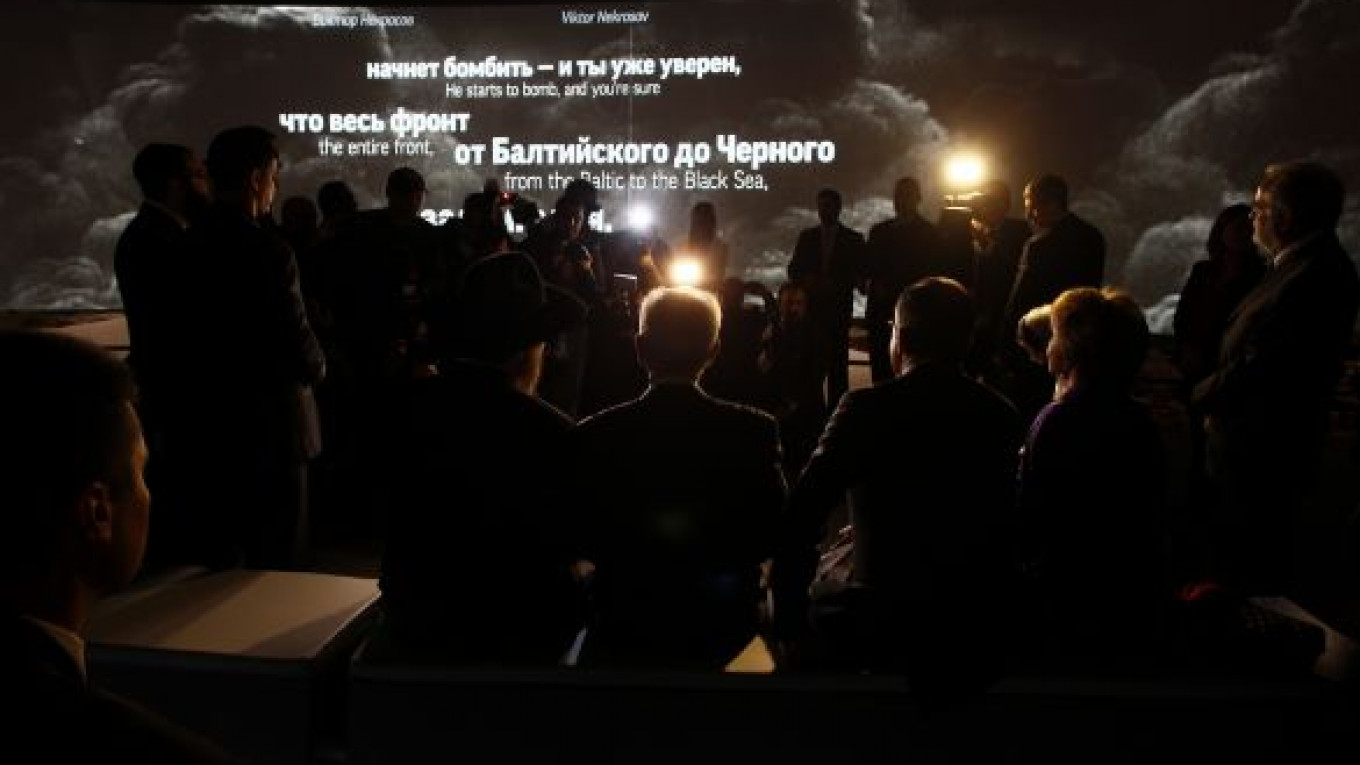Europe's largest museum devoted to Jewish history and culture is now open in an old, elegant bus garage in the north of Moscow.
The Jewish Museum and Tolerance Center in Moscow is a multimillion dollar sprawling, state-of-the-art show created by the Federation of Jewish Communities of Russia that allows visitors to see themselves dressed up as a rabbi, watch the beginning of the world and trace the good and the bad time of Jews in Russia.
"We had a clear vision when planning the museum," said Baruch Gorin, a spokesman for the Federation in an interview with The Moscow Times. "Our aim is to ask questions about the present: What does it mean to be a Jew in today's Russia?"
History is at the heart of the exhibition, charting the customs, culture and thought of Russian Jews from the inclusion of Poland's Jewish population in the Russian empire in the 18th century to the pogroms that swept through the Jewish community at the start of the 20th century and on to the age of Soviet dissidents and refuseniks.
Blending tradition with technology, the interactive exhibits allow the visitor to listen to the sounds of a 19th century shtetl, a Jewish settlement, engage with Jewish thinkers in a virtual Odessa café and immerse themselves in the Jewish vision of the Creation in a circular 4-D cinema.
"Over 90 percent of information is to be found in the interactive material," Gorin said. "This museum is not about objects, it is about the visitor's personal experience."
Visitors can be transformed with the touch of a screen into a rabbi or 19th century Jewish craftsman. By moving their hand, the pages of a digital Torah will turn.
Personal experience is used to illustrate the darker pages in Jewish history. Video interviews and excerpts from diaries give insight into the horrors of the Holocaust and the war effort of the early 1940s. A wooden plane flown by the only female Jewish pilot is on display.
The museum boasts a one-to-one scale model of a 1960s flat, complete with moving projections of inhabitants and recorded conversations, which bring to life the dilemmas of Soviet-Jewish families in the Brezhnev era.
The innovative exhibition was conceived by Ralph Appelbaum Associates, the world's largest museum design firm, who designed the United States Holocaust Memorial Museum. The museum has been dubbed "Jewish Disneyland," by the Internet TV channel Dozhd, but it is described by the designer himself as "a social learning experience."
"Visiting this museum is meant to be hard work," Appelbaum said at a news conference last Friday. "However, we have tried to make it as engaging and entertaining as possible, while showcasing its unique architectural setting."
One initial idea was that each visitor would have their photo taken and then see in a video their face as a member of a Jewish family and follow his or her life ahead, said Alexander Boroda, head of the Federation of Jewish Communities in an interview with Vedomosti newspaper. One of the possibilities would be to watch as they die in a concentration camp. The idea was dropped after lawyers said that visitors could sue if their virtual Jewish self died in the camps, the paper reported.
The museum is housed in a constructivist bus garage designed by Konstantin Melnikov and Vladimir Shukhov in 1926, which previously housed the Garage Center for Contemporary Art. A special exhibition on the two architects and the Russian Avant-Garde can be viewed on the building's mezzanine floor.
The garage also has an interactive "Tolerance Center," where visitors can work with videos touching on multiculturalism, pluralism and tolerance.
"This is not just about tolerance towards Jews," Boroda said. "Our aim is to promote mutual understanding and respect between all cultural and ethnic groups living in Moscow."
Israeli President Shimon Peres visited the complex last Tuesday as part of his diplomatic visit to Russia. "I would like to thank the Russian people," he said during the opening. "Thank you for several centuries of hospitality."
Some commentators were more skeptical. "Russia has been so accommodating that everyone has left," wrote one Facebook user who was quoted by the New York Times, recalling a recent nationalist march in the center of Moscow.
Jewish Museum and Tolerance Center in Moscow. 11A Ulitsa Obraztsova. Metro Marina Roshcha.
Related articles:
A Message from The Moscow Times:
Dear readers,
We are facing unprecedented challenges. Russia's Prosecutor General's Office has designated The Moscow Times as an "undesirable" organization, criminalizing our work and putting our staff at risk of prosecution. This follows our earlier unjust labeling as a "foreign agent."
These actions are direct attempts to silence independent journalism in Russia. The authorities claim our work "discredits the decisions of the Russian leadership." We see things differently: we strive to provide accurate, unbiased reporting on Russia.
We, the journalists of The Moscow Times, refuse to be silenced. But to continue our work, we need your help.
Your support, no matter how small, makes a world of difference. If you can, please support us monthly starting from just $2. It's quick to set up, and every contribution makes a significant impact.
By supporting The Moscow Times, you're defending open, independent journalism in the face of repression. Thank you for standing with us.
Remind me later.






